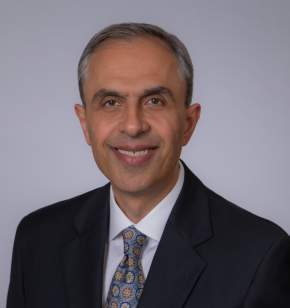Spinal Neurosurgery

- What is neuro spinal surgery?
- What’s the Difference Between a Neurosurgical Spine Surgeon and an Orthopedic Spine Surgeon?
- Where To Find a Neurosurgeon Specializing in Spinal Neurosurgery?
- Who Works With Spinal Neurosurgery Surgeons?
- What Is the Difference Between a Spine Specialist and a Neurosurgeon?
- Is Spine Neurosurgery a Subspecialty?
- Training and Education Requirements for Spine Neurosurgeons
- Key Takeaways

Are you wondering about the field of spine neurosurgery? For families and patients new to neurosurgery, all the different types of doctors can be confusing. This article will explain the many facets of spine surgery and why neurosurgeons are uniquely qualified spine surgeons.
What types of conditions do spinal neurosurgery surgeons treat? How are they different from orthopedic spine surgeons? Where can you find a neurosurgeon who specializes in spine conditions?
Below, we'll answer all these questions and more.
What is neuro spinal surgery?
Spinal neurosurgery involves evaluating, diagnosing, and treating neurological conditions related to the spine and spinal cord.
A neurosurgeon spine surgery specialist will perform back surgery to treat degenerative conditions such as back pain, spinal stenosis, scoliosis (deformity), and disk herniation, trauma (spine fractures), tumors (of spine bones and spinal cord), congenital malformations of the spine, and other diseases impacting the structure or function of the spine.
Here are several specific diseases treated by a spine neurosurgeon:
- Compression fractures
- Degenerative disc disease
- Degenerative spondylolisthesis
- Herniated discs
- Spinal stenosis
- Scoliosis and spinal deformities
- Tumors, such as chordoma and chondrosarcoma
- Spina bifida
These are just a few of the many spinal disorders that spine neurosurgeons treat. Depending on the specific condition, they can operate on any portion of the spine, from the top (cervical) to lower (lumbar) areas.
Some top neurosurgeons for back surgery specialize in treating different complexities of disease. In the next section, we’ll talk more about the different types of spine neurosurgeons.
What’s the Difference Between a Neurosurgical Spine Surgeon and an Orthopedic Spine Surgeon?
At the end of the day, neurosurgeons and orthopedic surgeons treat many of the same diseases related to the structure and function of the spine. However, differences and limitations do exist.
Neurosurgeons and orthopedic surgeons both attend residency training after completing medical school.
-
Neurosurgery is currently a 7-year residency program with spine surgery being a key curricular component. Neurosurgical residents commonly practice spine surgery right out of residency.
Some neurosurgical graduates complete fellowship programs for minimally invasive and complex spine deformities. Neurosurgeons are especially trained to remove spinal cord tumors.
-
Orthopedic surgery is a 5-year residency with an emphasis on restoring mechanics of bones and joints throughout the body. Many, if not all orthopedic surgeons, choose to complete a 1-year fellowship before entering practice as a spine surgeon.
These surgeons are especially well trained in the biomechanics of the spine and management of deformity and scoliosis.
Now, let's address where to find spine neurosurgeons.
Why should you have your surgery with Dr. Cohen?
Dr. Cohen
- 7,500+ specialized surgeries performed by your chosen surgeon
- More personalized care
- Extensive experience = higher success rate and quicker recovery times
Major Health Centers
- No control over choosing the surgeon caring for you
- One-size-fits-all care
- Less specialization
For more reasons, please click here.
Where To Find a Neurosurgeon Specializing in Spinal Neurosurgery?
A neurosurgeon spine surgery specialist can be found in most cities. While any neurosurgeon is qualified to perform routine brain surgery and spine surgeries, those specializing in complex spine conditions may be more centralized to ensure the availability of appropriate technologies and resources in the hospital to care for those patients with more complex problems.
Sometimes, you’ll have to travel to find a spinal neurosurgery surgeon specializing in a particular disorder.
Here are some places you may find spine neurosurgeons:
- Private clinics. Many spine neurosurgeons have their own practice while operating at a nearby hospital.
- Community hospitals. These hospitals may not be associated with a university, but they are still quite large and well equipped to provide a vast array of neurosurgical services.
- Research/academic hospitals. These are large hospitals that are typically associated with a university. These facilities employ academic spine surgeons who are engaged in teaching and research, and have access to cutting edge technologies for spine care.
- Second opinions. Private neurosurgical spine surgeons have the freedom to refer their patients anywhere, as they are not restricted to using their own hospital's network. This isn't always an issue, but it's something to consider when contemplating second opinions.
Due to the complexity of the care of patients suffering from spine disorders, and variations in the practice styles of spine surgeons, second opinions are encouraged for patients who require extensive spinal surgeries include fusions.
Who Works With Spinal Neurosurgery Surgeons?
Neurosurgical spine surgeons don't work alone. Similar to a professional sport, spine surgeons are part of a larger team, working together to treat neurological diseases of the spine.
Here are several professionals who work closely with spine neurosurgeons:
- Neurologists. Neurologists don't typically perform surgery, but they are experts in the medical diagnosis of conditions affecting the nervous system (brain and spinal cord) and are a key referral source (gatekeeper) of patients who initially come to them for help with their symptoms.
- Radiologists. Radiologists are imaging experts and routinely identify pathology of the spine that may need consultation for neurosurgical intervention.
- Oncologists. Given the unique role neurosurgeons play in treating tumors within the spine, tumor and cancer specialists work closely with neurosurgeons to diagnose and treat tumors.
- Pain management specialists. These physicians treat painful conditions of the spine.
- Rehabilitation doctors. These colleagues support medical treatment of spine conditions and assist with post-surgical recovery.
Now, let's answer a common question.
What Is the Difference Between a Spine Specialist and a Neurosurgeon?
A spine specialist is a medical doctor who focuses on the diagnosis and treatment of spinal disorders. This term can encompass various types of healthcare providers, including orthopedic surgeons, neurosurgeons, physiatrists, anesthesiologists specializing in pain management, chiropractors, and physical therapists.
When referring to a neurosurgeon spine surgery specialist in the context of surgical intervention, it typically denotes either an orthopedic surgeon or a neurosurgeon with specialized training in spine surgery.
Is Spine Neurosurgery a Subspecialty?
Spine is a subspecialty of neurosurgery. Why are there so many specialties in neurosurgery? The spine is different from the brain. Specialization allows neurosurgeons, including neurosurgeon spine specialists, to gain even more mastery in one specific area. In short, specialization improves patient outcomes.
But how does one become a neurosurgeon, let alone a neurosurgeon specializing in spine? Let's quickly talk about surgical training requirements.
Training and Education Requirements for Spine Neurosurgeons
Like all physicians, neurosurgeons specializing in spine must complete their undergraduate program, typically four years. Then, they must complete medical school, which lasts another four years. After that, they begin a residency in neurological surgery, which usually lasts seven years.
Next, they may complete a year-long fellowship to specialize further. Some people wonder if a fellowship is required for spine neurosurgery. The answer is no. Graduates at most neurosurgical residency programs are proficient at spine surgery by the time they complete residency. However, residents pursuing careers in complex spinal neurosurgery such as deformity corrections (scoliosis) and other types of minimally invasive spine surgery may benefit from additional training.
In addition to these educational requirements, some spine neurosurgeons practice with different techniques and philosophies.
Philosophies and fellowships of spine neurosurgery surgeons include:
- Open spine surgery. This type of surgery involves traditional incisions with complete visualization of the pathology to be treated.
- Minimally invasive. This method reduces the amount of tissue disturbed during surgery. Often, minimally invasive surgery has been shown to improve healing and patient comfort, but this may come at an increased length of operation in some cases. Patient selection is important for best outcomes.
- Awake procedures. During these procedures, local and regional anesthetics are used to prevent pain; the patient does not undergo general anesthesia. The patient is conscious, yet comfortable, for the surgery.
While these procedures may improve recovery from surgery, they are not commonly used in general practice, are restricted to many highly specialized institutions, and for specific patient groups and indications.
Please note that every patient and every diagnosis should be carefully considered for each surgical philosophy and one philosophy and treatment plan must not be applied to all patients. Therefore, your treatment plan should be individualized for best outcomes.
Time for our final take.
Key Takeaways
- Overall, neurosurgeons are well-trained spine surgeons. You can find them in private clinics, or large research hospitals. Top neurosurgeons for back surgery work closely with other healthcare professionals to treat a vast array of spinal conditions.
- If you ask any neurosurgical spine surgeon, they will say that learning never stops. They are constantly researching ways to hone their craft and improve the lives of their patients.











